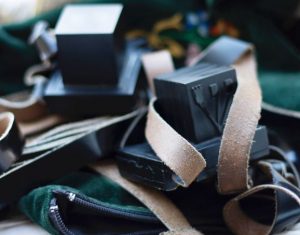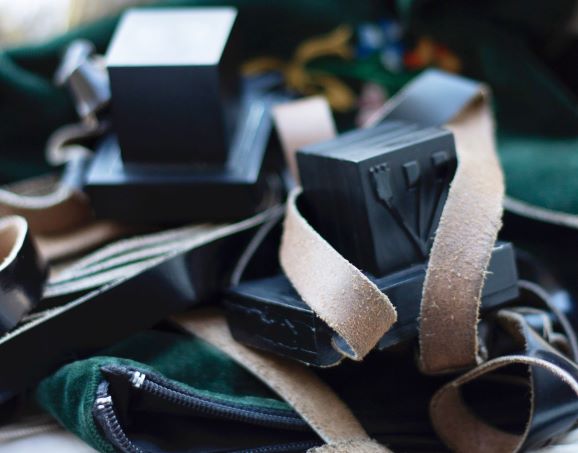
In Parshas Ki Sisa, Moshe asks to see the Glory of G-d (Shemos 33:18). Hashem’s response was: “…I shall cause all My goodness to pass before you, and I shall call out with the Name Hashem before you; and I shall show favor when I shall show favor, and I shall have mercy when I shall have mercy… You shall not be able to see My Face, for no human can see My Face and live.” (Shemos 33:19-20).
This seems like a strange dialog between Moshe Rabbeinu and the Ribono shel Olam. Rashi quotes a Gemara (Brochos 7a) that when Hashem passed over Moshe, Hashem showed Moshe the Tefillin knot on the back of His head Tefillin. We reference this incident in a line towards the end of Anym Zemiros: Kesher Tefillin her’ah l’anav (He showed the Tefillin knot to the humble one).
In fact, Rashi there in Maseches Brochos spells out this Talmudic allusion: This refers to the head Tefillin knot at the nape of the neck. )The Talmud in fact states elsewhere that Moshe did not understand what the knot at the back of the head Tefillin looked like, and the Ribono shel Olam showed him exactly how it looked.(
I saw a beautiful homiletic idea in a sefer. What does it mean that Moshe did not understand the knot of the Tefillin shel Rosh? Does it mean that he understood everything else about Tefillin perfectly, without needing to be shown what it looked like? Did he perfectly visualize a Tefillin bayis (compartment holding the parchment) or the knot of the hand Tefillin? What does it mean that he didn’t understand what the knot of the Tefillin shel Rosh looked like?
Rav Firer says an interesting thing. Several times throughout Parshas Ki Sisa, Hashem complains about Klal Yisrael that they are a stiff-necked people (am k’shei oref). Let us pause and ask ourselves – is it a bad thing or a good thing to be a “stiff necked nation”? On the one hand, from the fact that the Ribono shel Olam keeps on complaining in this parsha that we are an am k’shei oref, it would seem to be a very bad thing. On the other hand, the stiff-neck property of the Jewish nation is one of the secrets of our continued existence. If we would not be stubborn, we would not have survived.
This is a classic example of one of the great truths of life, namely that there is no character trait (midah) that is either all good or all bad. Everything depends on how and where and when that midah is used. When the Ribono shel Olam complains that Klal Yisrael is an am k’shei oref, it is an appropriate complaint. It reflects the fact that they were a rebellious and contentious people. They were a hard and argumentative nation, and they gave Moshe Rabbeinu and (as it were) the Almighty much grief. But on the other hand, thousands and thousands of Jews have persevered over the centuries in spite of untold persecutions. They were willing to die to sanctify G-d’s Name. That is also a result of the fact that we are an am k’shei oref.
Rav Firer suggests—and there is an irony in this—that we place the Tefillin shel Rosh on the very spot that symbolizes our being an am k’shei oref (i.e., the back of the neck!) Moshe wanted to know over here—and the Ribono shel Olam was showing him—how we use the Kesher shel Tefillin:
To what is our characteristic of stubbornness bound? If we tie it to rebelliousness and heresy then it is a terrible thing. But if the midah of am k’shei oref is tied to the right thing—to mesiras nefesh and to perseverance and resilience—then it indeed becomes a beautiful characteristic.
The secret of the Kesher shel Tefillin is that the nature of this characteristic of stubbornness is entirely dependent on the aspect of our personalities to which it is bound. If it is bound to the right ideologies, it indeed becomes a tremendous thing.
This resolves a perplexing question. There are three pesukim in this parsha, in which the Almighty complains to Moshe Rabbeinu that Bnei Yisrael are a stiff-necked nation. But then, towards the end of the parsha—which we read on every public fast day—Moshe says: “If I have now found favor in Your eyes, my L-rd, may my L-rd please go in our midst – for it is a stiff-necked people, and may You forgive our iniquity and our error, and make us a portion. ” (Shemos 34:9)
Does this make sense? The Ribono shel Olam is complaining over and over to Moshe Rabbeinu that the Jews are an am k’shei oref, which is tempting Him to destroy them all, yet Moshe Rabbeinu argues back that Hashem should stay with them BECAUSE they are an am k’shei oref! This seems illogical!
This is the secret that Moshe Rabbeinu just now learned. It all depends on what we do with that attribute. Moshe argues that the Almighty should stay with the Jewish people because the very fact that they are so stubborn is the reason they will be willing to be moser nefesh for Him when the time comes.
This is the way it is with every Midah. There is no human character trait—be it jealousy or anger or hatred—that is only negative and destructive. There is a proper time and place to utilize all of these human emotions and character traits. “Everything has its season, and there is a time for everything under the heaven… A time to love and a time to hate; a time for war and a time for peace” (Koheles 3:1-9)
So too, there is a time for stubbornness and a time for being soft. It just depends to what the attribute is bound, and that is the secret of the Kesher shel Tefillin.
Not the Cry of Battle, but Rather the Cry of “Anos”
Elsewhere in the parsha, there is another difficult pasuk to understand: “Yehoshua heard the sound of the people in their shouting, and he said to Moshe, ‘The sound of battle is in the camp.’ He said, ‘It is not the sound of shouting of might nor the sound of shouting of weakness, an ANOS sound do I hear.'” (Shemos 32:17-18).
Moshe and Yehoshua both heard loud screams coming from the location of the Israelite camp. Yehoshua suggested to Moshe that they were hearing battle sounds. Moshe disagreed: He told Yehoshua that they were hearing neither the sounds of military victory nor military defeat. They were the screams of ‘anos‘. What is the simple interpretation of the expression Kol Anos? What does that mean?
In Maseches Taanis, the Talmud Yerushalmi says that Moshe responded somewhat critically to Yehoshua: The person who will one day be the leader of 600,000 Jews cannot discern the difference between one type of scream and another? What exactly was Moshe’s complaint to Yehoshua?
Rav Schwab shares a beautiful pshat in his sefer: Yehoshua heard these screams and he proclaimed: These are the screams of rebellion in the camp. These are the screams of people who have abandoned the Ribono shel Olam and have built an idolatrous Golden Calf. This is a revolt on the part of the people! That is the “Kol Milchama b’Machaneh.”
Moshe chastised him. “Yehoshua, as a future leader you need to understand the nature of this noise. These are not the screams of people who are victorious. These are not the screams of people who are weak. This is a ‘Kol Anos‘”. (Rav Schwab says the word ‘Anos‘ (ayin-nun-vov-taf) is etymologically related to the word ‘eenui‘ (ayin-nun-vov-yud).) “It is the cry of people who are in pain. They are suffering and in pain because they don’t know what happened to me. They fear they have lost their leader. They are like a baby crying because it lost its mommy.” They are not rebelling against the Ribono shel Olam. They are screaming because they are scared and they don’t know where to turn.
This is a Kol Anos—a cry of pain, inui, and confusion. Moshe chastises Yehoshua for misreading the screams because a true Jewish leader needs to be able to discern the difference between a cry of rebellion and a cry of pain. A leader must be able to figure out the cause of the people crying.
This lesson applies to all of us as well. We as parents, or we as teachers must properly read what’s behind our children or our students acting out and misbehaving. It might look like an act of chutzpah or an act of rebellion but it may be something else. Sometimes that is not really the cause. The only way such “rebellion” can be redirected is by understanding the real cause.
Children sometimes say and do hurtful things. Our initial reaction might be “How dare they say that? This is out and out chutzpah and rebellion!” No! Sometimes something deeper is going on, and we need to know how to react. This is the mussar that Moshe Rabbeinu was giving to Yehoshua: “The one who is destined to be a leader over 600,000 Jews does not know how to distinguish between one type of cry and another?!” Understanding what is really behind the cry is the only way a leader will ever be able to set the people straight.
Transcribed by David Twersky; Jerusalem [email protected]
Technical Assistance by Dovid Hoffman; Baltimore, MD [email protected]
This week’s write-up is adapted from the hashkafa portion of Rabbi Yissochar Frand’s Commuter Chavrusah Series on the weekly Torah portion. A listing of the halachic portions for Parshas Ki Sisa is provided below:
- # 046 Dealing with Illness on Shabbos
- # 089 Returning From a Medical Emergency on Shabbos
- # 137 The Census: Can Jews Be Counted?
- # 184 You and the Seriously Ill: How Much of a Responsibility?
- # 230 The Mitzvah of Shekalim and Davening Musaf
- # 274 Saying Tehillim at Night
- # 320 The Melacha of Dyeing
- # 364 The Melacha of Memachek
- # 408 Fax Machines on Shabbos
- # 452 Kiddush Shabbos Morning
- # 496 Tallis: Bringing It Home On Shabbos
- # 540 Machatzis Hashekel
- # 584 The Meat Delivery At Your Door
- # 628 Mincha – How Early, How Late?
- # 671 Neigel Vasser- Washing Hands When Arising
- # 716 Shaliach Mitzva: Is He Always Safe?
- # 760 Can You Sell Your Aveiros?
- # 804 Great Grandchildren
- # 848 Oy! The Fridge Light Is On
- # 892 Borer: Can You Separate White Meat from the Dark Meat?
- # 936 The Obligation to Learn Tanach
- # 979 Chilul Shabbos to Save a Person Who Will Die Shortly
- #1023 The Onion That Was Cut With a Fleishig Knife
- #1067 Cleaning Plastic Tablecloths, Contact Lenses on Shabbos
- #1110 Washing Your Hands Before Mincha
- #1153 Rinsing Out Your Mouth On A Fast Day
- #1196 Taking a Choleh to the Hospital on Shabbos: You or a Non-Jew?
- #1240 Borer Shailos: Piles of Seforim, Pots in the Fridge and the Messy Freezer
- #1327 Nagel Vasser By Your Bed: Necessary?
- #1371 The Hazala Member Who’s NOT On Call On Shabbos: Can He Go On the Call Anyway?
- (2019) Is It Six Hours Since I Ate Fleishigs? Can I Be Maikil and Eat Milchigs Anyway?
- #1460 Being Mechalel Shabbos to Relieve the Anxiety of a Choleh Mesukan: Is it Mutar?
A complete catalogue can be ordered from the Yad Yechiel Institute, PO Box 511, Owings Mills MD 21117-0511. Call (410) 358-0416 or e-mail [email protected] or visit http://www.yadyechiel.org/ for further information.
Available December 10, 2013


